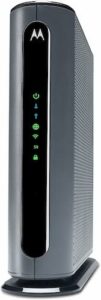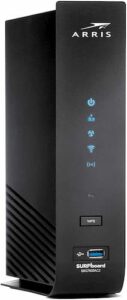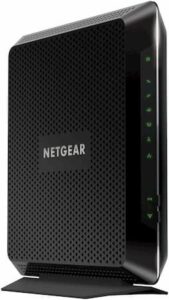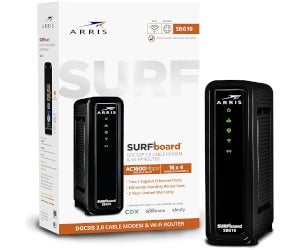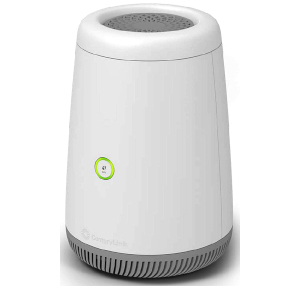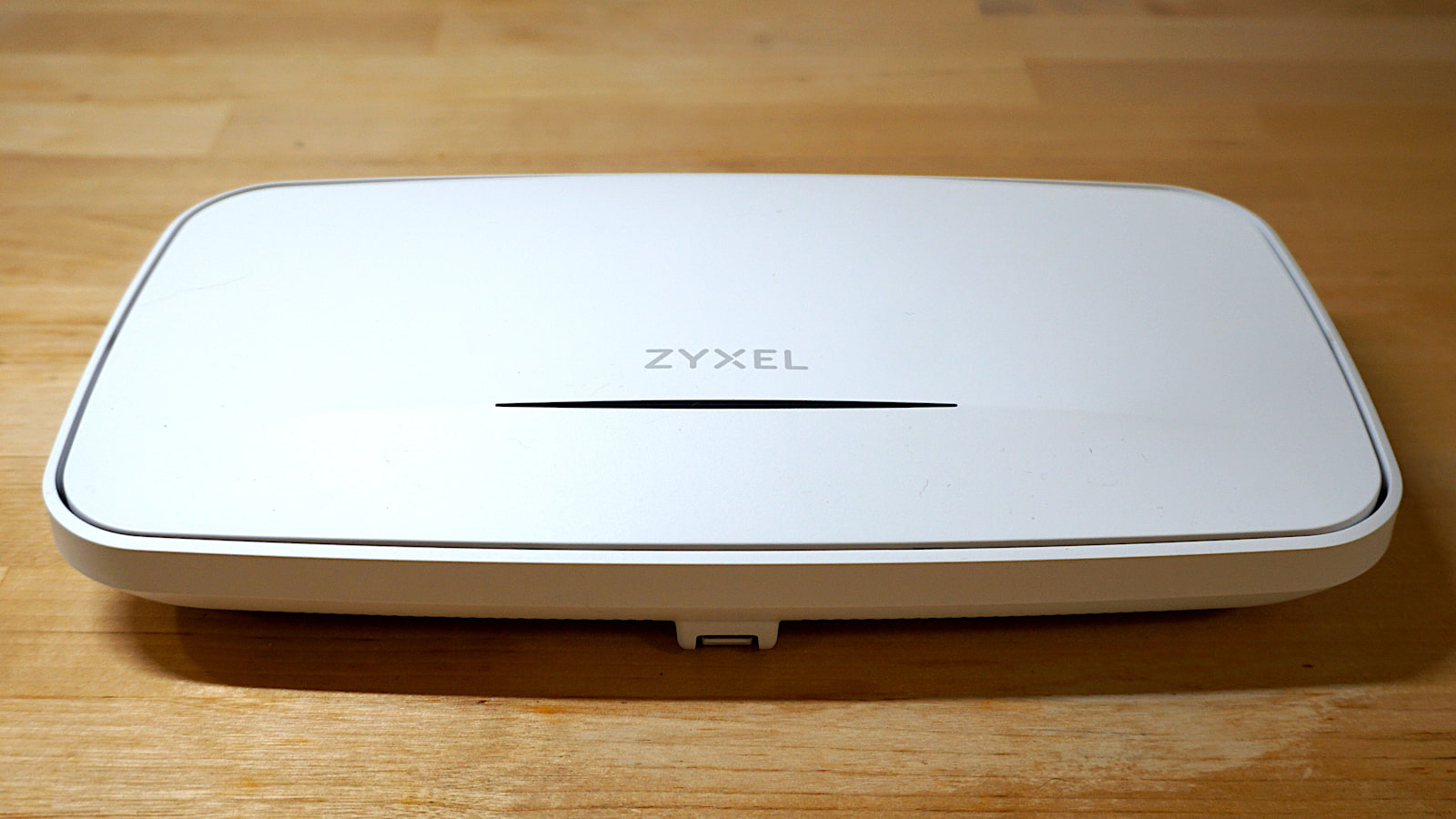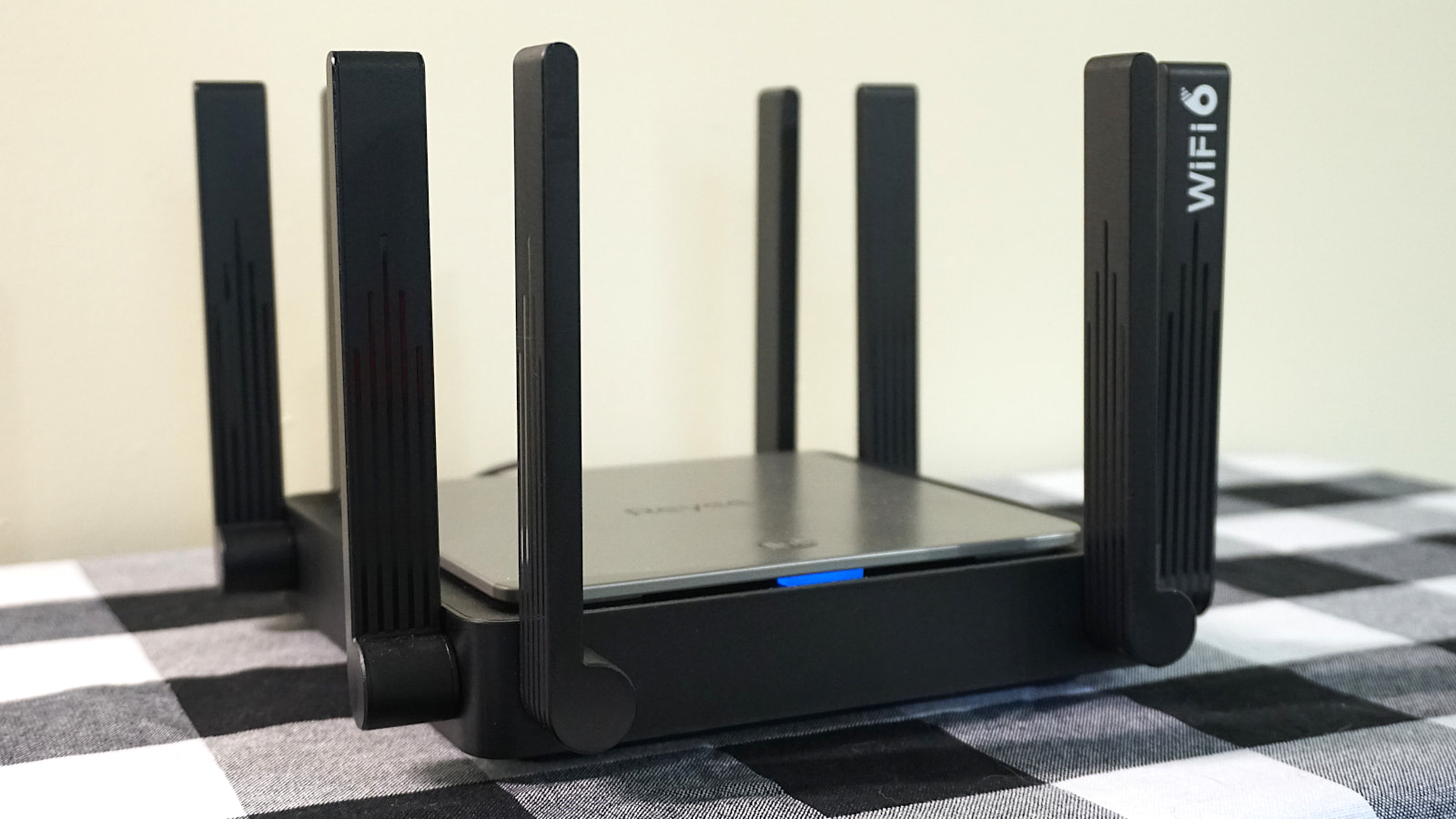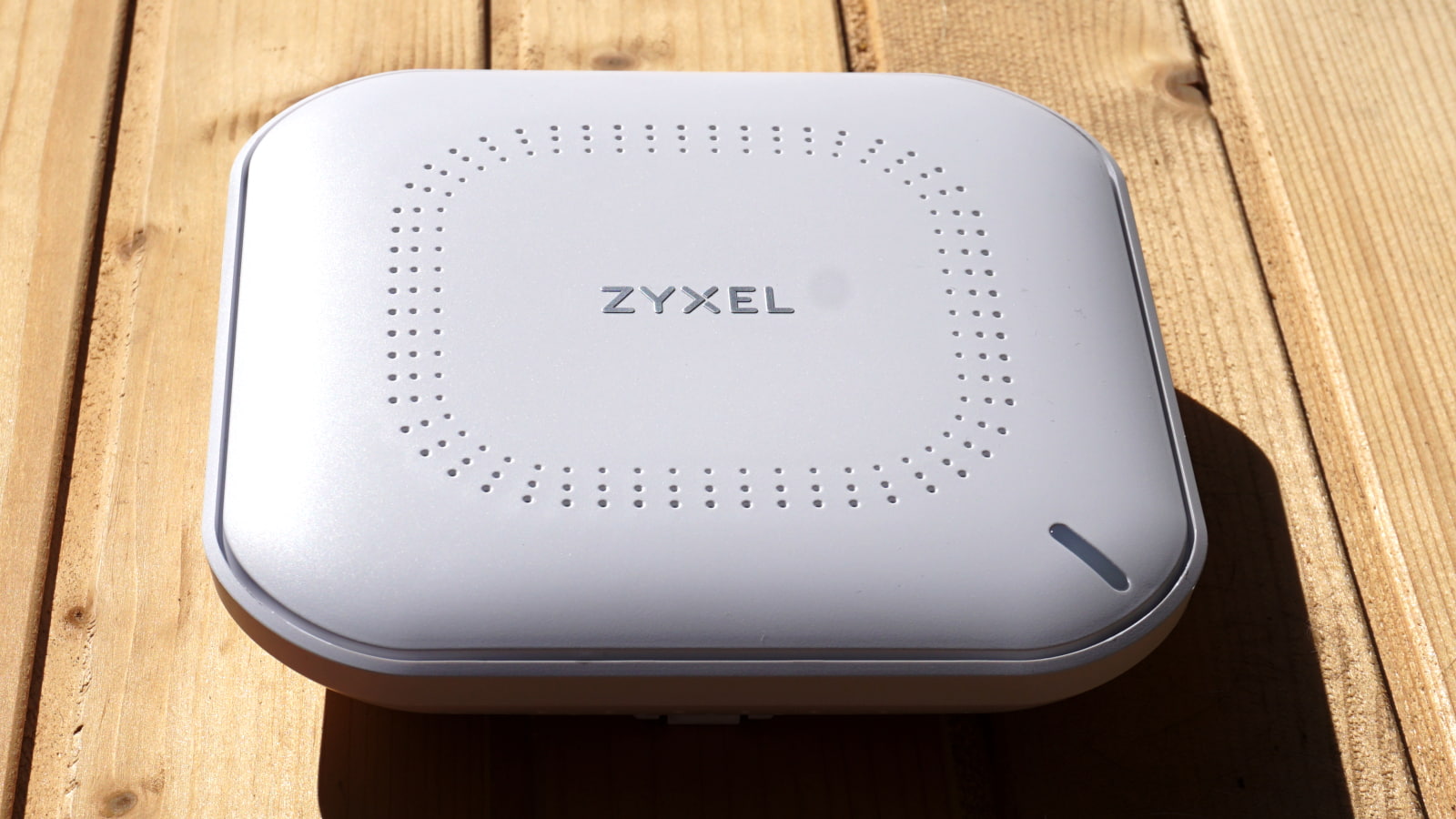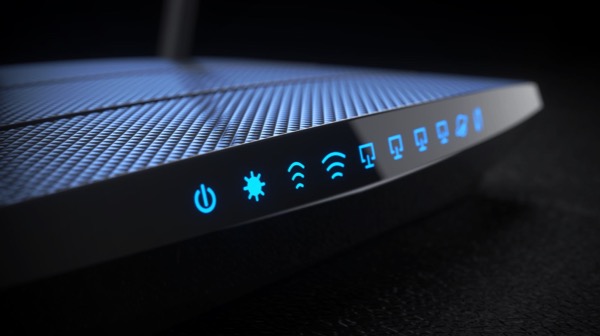Best Modem Router Combos for Superfast Connections 2024
Why go with a boring modem when you can combine it with a router to free up shelf space?
Sep 11, 2023 | Share
Equipment Guides, Featured
-
Best overallMotorola MG7700
- $149.99
- Wi-Fi: AC1900
- Modem: 1,000Mbps
-
Best for speedARRIS SURFboard SBG7600AC2
- $180.99
- Wi-Fi: AC2350
- Modem: 1,000Mbps
-
Best for gamingNETGEAR Nighthawk C7000
- $245.00
- Wi-Fi: AC1900
- Modem: 1,000Mbps
-
Best for budgetsARRIS SURFboard SBG10
- $87.99
- Wi-Fi: AC1600
- Modem: 680Mbps
-
Best for DSLGreenWave C4000 BG
- $176.97
- Wi-Fi: AX3000
- Modem: 140Mbps
Amazon.com prices (as of 9/8/23 07:23 MST). See full disclaimer.
Our pick: Which modem router combo is best?
The Motorola MG7700 is the best cable modem router combo you can get. It works with most major cable internet providers and handles internet speeds up to 1,000Mbps. Don’t have cable internet? We list the best DSL modem router combo too if you’re ready to upgrade from your provider’s boring rental.
The 5 best modem router combos
- Best overall: Motorola MG7700
- Best for speed: ARRIS SURFboard SBG7600AC2
- Best for gaming: NETGEAR Nighthawk C7000
- Best for budgets: ARRIS SURFboard SBG10
- Best for DSL: GreenWave C4000 BG
Compare modem router combo specs and prices
| Model | Modem max speed | Wi-Fi max throughput | Price | Get it | |
|---|---|---|---|---|---|
| Best overall | Motorola MG7700 | 1,000Mbps | 1,900Mbps | $149.99 | View on Amazon |
| Best for speed | ARRIS SURFboard SBG7600AC2 | 1,000Mbps | 2,350Mbps | $180.99 | View on Amazon |
| Best for gaming | NETGEAR Nighthawk C7000 | 1,000Mbps | 1,900Mbps | $245.00 | View on Amazon |
| Best for budgets | ARRIS SURFboard SBG10 | 680Mbps | 1,600Mbps | $87.99 | View on Amazon |
| Best for DSL | GreenWave C4000 BG | 140Mbps | 3,000Mbps | $176.97 | View on Amazon |
Amazon.com prices (as of 9/11/23 07:23 MST). See full disclaimer.
What should you look for in a modem router combo?
First, make sure the modem router combo you want is compatible with your internet provider. Most cable modem router combos work with specific internet providers like Xfinity, Cox, and Spectrum—and very few work with DSL providers like CenturyLink or Frontier.
Every internet provider should have a list of compatible modems and modem router combos listed on its website. Here’s how to find a compatible device for your internet plan from a few ISPs:
- Approved Third-Party Equipment for Xfinity
- Cox Certified Cable Modems
- Authorized Modems to Use on the Spectrum Network
For more recommendations on what to look for in a modem router combo, check out the specs and features section below.
Best overall—Motorola MG7700
$149.99
Specs:
- Modem type: DOCSIS 3.0 24×8
- Download speed: Up to 1,000Mbps
- Max wired speed: 1,000Mbps
- Max 5 GHz speed: 1,300Mbps
- Max 2.4 GHz speed: 600Mbps
- Ethernet Ports: 4
- Compatible ISPs: Xfinity, Cox
Amazon.com price (as of 9/8/23 07:23 MST). See full disclaimer.
The Motorola MG7700 packs a powerful punch, with support for internet speeds up to 1,000Mbps. The Gigabit Ethernet ports let you plug in your devices directly for a faster connection, while dual-band Wi-Fi support and beamforming provide fast and reliable wireless.
If all that sounds like gibberish, don’t worry—all you need to know is this cable modem router combo packs a ton of modern features into one sleek package to maximize your internet speed and reliability.
Even after all that, this cable modem router packs one more feature that makes it our pick for best overall. Motorola calls it the “Wireless Power Boost,” but we just call it awesome.
Basically, this tech amplifies the wireless signal and extends its range so you can cover a larger area with a single box. This added range makes it perfect for larger homes or pretty much any area where you want a strong signal, no matter where you’re located.
 Pros:
Pros:
- Extended wireless range
- Strong performance
- Beamforming technology for more reliable Wi-Fi
 Cons:
Cons:
- Approved for use only with Xfinity and Cox
- Not the most attractive device
Best for speed—ARRIS SURFboard SBG7600AC2
$180.00
Specs:
- Modem type: DOCSIS 3.0 32×8
- Download speed: Up to 1,000Mbps
- Max wired speed: 1,000Mbps
- Max 5 GHz speed: 1,700Mbps
- Max 2.4 GHz speed: 600Mbps
- Ethernet Ports: 4
- Compatible ISPs: Xfinity, Cox, Spectrum
Amazon.com price (as of 9/8/23 07:23 MST). See full disclaimer.
If speed is your need, this ARRIS cable modem router combo really delivers. With a maximum throughput of up to 1,000Mbps, this little fella can handle plenty of internet traffic. The Gigabit Ethernet ports let you plug your devices straight in for optimum speed, or you can take advantage of the built-in AC2350 Wi-Fi.
Different cable internet providers approve this modem router for different speed tiers. For example, Xfinity recommends it for speeds up to 600Mbps, but Cox has lower max speed recommendations—only up to 300Mbps.
Be sure to check this device’s compatibility with your internet provider’s speeds before you make the investment.
 Pros:
Pros:
- Excellent Wi-Fi speeds
- Compatibility with most common providers
 Cons:
Cons:
- Higher price tag
Best for gaming—NETGEAR Nighthawk C7000
$245.00
Specs:
- Modem type: DOCSIS 3.0 24×8
- Download speed: Up to 1 ,000Mbps
- Max wired speed: 1,000Mbps
- Max 5 GHz speed: 1,300Mbps
- Max 2.4 GHz speed: 600Mbps
- Ethernet Ports: 4
- Compatible ISPs: Xfinity, Cox, Spectrum
Amazon.com price (as of 9/8/23 07:23 MST). See full disclaimer.
This futuristic-looking NETGEAR Nighthawk cable modem router combo pairs gigabit speeds with useful features to give gamers an edge.
The 1.6 GHz processor helps deliver prioritized traffic for maximum speed. This chip is especially important for gaming, where lag and network delays can be costly. And beamforming increases reliability, so you don’t have to worry about losing your connection at a critical moment.
 Pros:
Pros:
- Powerful processor to boost gaming performance
- Beamforming tech for long wireless range and a reliable connection
- Guest network for keeping your password private
 Cons:
Cons:
- More expensive model
- Has a love-it-or-hate-it design
Best for budgets—ARRIS SURFboard SBG10
$87.99
Specs:
- Modem type: DOCSIS 3.0 16×4
- Download speed: Up to 680Mbps
- Max wired speed: 1,000Mbps
- Max 5 GHz speed: 1,300Mbps
- Max 2.4 GHz speed: 300Mbps
- Ethernet Ports: 2
- Compatible ISPs: Xfinity, Cox, Spectrum, and more
Amazon.com price (as of 9/8/23 07:23 MST). See full disclaimer.
Whether you’re on a budget or just don’t need the fancy features, our pick for the best budget modem router combo is another one from ARRIS: the SBG10.
This gateway supports all the major US cable providers, and at a lower price than our other picks, it’s a great value. Its Wi-Fi speeds on the 5 GHz band can be overkill, zooming up to 1,300Mbps compared to the modem portion’s 686Mbps max speed. ARRIS suggests using this combo unit with plans speeding up to 400Mbps.
The biggest downside to the SBG10 is connectivity. It comes with just two Ethernet ports, but if you need more, you can get one of the best gigabit Ethernet switches to expand your wired connectivity.
That said, this is still a good option. If price is your primary concern, you can’t go wrong with the ARRIS SURFboard SBG10.
 Pros:
Pros:
- Comes at an easy-to-swallow price
- Works with most major cable providers
 Cons:
Cons:
- Slower speeds than more expensive models
- Only two Ethernet ports
Best for DSL—GreenWave C4000 BG
$176.97
Specs:
- Download speed: Up to 140Mbps
- Max wired speed: 1,000Mbps
- Max 5 GHz speed: 2,400Mbps
- Max 2.4 GHz speed: 600Mbps
- Ethernet Ports: 4
- Compatible ISPs: All ADSL and VDSL profiles up to 17a
- DSL type: Bonded
Amazon.com price (as of 9/11/23 07:23 MST). See full disclaimer.
The GreenWave C4000 BG works with any ADSL or VDSL service with profiles up to 17a. That essentially means this DSL modem router combo has a maximum downstream rate of 150Mbps and a maximum upload of 50Mbps.
But here’s the thing: You’ll see a maximum download of just 140Mbps on a bonded VDSL line. ADSL2 lines get up to 40Mbps—this gateway does not support ASDL lines.
What’s interesting about this gateway is that it broadcasts faster Wi-Fi 6 speeds than what your DSL service will ever provide: up to 600 Mbps on the 2.4 GHz band and up to 2,400Mbps on the 5 GHz band.
Originally designed by ZyXEL, the C4000 BG sets you up for fiber internet whenever it becomes available. Just connect it to your future ONT via Ethernet (when you eventually upgrade), and you’re good to go.
 Pros:
Pros:
- Works with major DSL providers
- Has an appealing design
- Offers lots of ports
 Cons:
Cons:
- No dedicated phone port
- USB port is 480Mbps only
Modem router combo specs and features
When shopping for a modem router combo, there are a few things you need to keep in mind to ensure you get the best experience.
Internet plan compatibility
If you have unusually fast internet, like a Gigabit plan, make sure the modem router you choose can support it. Most modern routers and modems can handle these speeds, but inexpensive models or older stock may not have the necessary protocols.
What happens if your modem router can’t handle your internet speed? It’ll still work, so you can use it. But modems and routers are rated for a certain maximum speed, and if your plan gives more than your devices can handle, the extra speed is wasted.
Modems vs. routers
A modem translates your provider’s internet signal into data your devices can understand. This data moves on to a wireless router which broadcasts the data through wired connections and over the air. Without a wireless router, you wouldn’t have home network security, network traffic management, or Wi-Fi.
A modem router combo (or wireless gateway) merges the two devices into one standalone unit. It saves space and makes the purchase and configuration easier, although that comes at the expense of flexibility and upgradeability.
Combo vs. individual equipment
The main reason to go for a modem router combo is convenience—both devices are packaged in one enclosure, saving space and making device management that much easier.
The downside of a combined device is the lack of flexibility. You can’t adjust the antennas, so you’re stuck if you can’t get a connection on the second floor or in a basement. You can always buy a standalone router and disable Wi-Fi in the gateway, but that’s an added expense. Gateway range is generally shorter than the best standalone routers on the market.
Now, for most people, the convenience of the combined device will very likely outweigh any potential cons. On the other hand, power users may want separate devices to allow for future upgradeability and more powerful wireless routers that cater to a specific need, like streaming or large homes.
Pro tip:
If you’re interested in separate equipment, check out these detailed guides for more insight:
Shopping around for new internet?
Enter your zip code below to see which providers are available in your area.
Our verdict
Overall, we recommend the Motorola MG7700. It’s compatible with major cable internet companies, easy to use, and can handle internet speed packages up to 1,000Mbps. It’s a great modem router combo that keeps all your home networking equipment in one place.
FAQ about modem router combos
Do modems affect your internet speed?
A modem can affect your internet speed if it’s failing or slower than your plan’s advertised maximum speed. You also can’t magically increase your connection’s speed by purchasing a modem that’s faster than what your plan allows.
For example, you won’t see speeds above 200Mbps using a 600Mbps cable modem if your plan’s maximum is only 200Mbps. If you have a gigabit plan, but your modem doesn’t go beyond 600Mbps, then your plan is too fast for your modem.
What is the best router for gaming?
The ASUS ROG Rapture GT-AX11000 is our current top pick for gaming. It packs a quad-core processor and up to 11,000Mbps in total throughput. For a more detailed answer, take a look at our roundup of the best routers for gaming.
What is dual-band Wi-Fi?
Dual-band Wi-Fi is a feature where wireless routers broadcast internet connectivity over the 2.4 GHz and 5 GHz radio frequencies simultaneously—single-band routers use only the 2.4 GHz frequency. Dual-band Wi-Fi helps provide faster speeds by distributing traffic on two frequencies instead of one.
What is beamforming?
Beamforming is a technology that focuses two or more wireless signals in a single, specific direction. It doesn’t create an actual beam but instead times each broadcast just right so they intersect to provide the best wireless speeds at your present location.
What does Mbps mean?
Mbps stands for megabits per second. It’s the unit used to measure internet speed, which is essentially how much data passes through the connection in a second. For some context, eight megabits are equal to one Megabyte (MB), the unit for file sizes. So, to download a 10MB file in one second, you need an 80Mbps connection.
Pro tip
If you have questions about internet speed, check out our complete guide.
Disclaimer
Product prices and availability are accurate as of the date/time indicated and are subject to change. Any price and availability information displayed on Amazon.com at the time of purchase will apply to the purchase of this product. HighSpeedInternet.com utilizes paid Amazon links.
CERTAIN CONTENT THAT APPEARS ON THIS SITE COMES FROM AMAZON. THIS CONTENT IS PROVIDED ‘AS IS’ AND IS SUBJECT TO CHANGE OR REMOVAL AT ANY TIME.
Author - Rebecca Lee Armstrong
Rebecca Lee Armstrong has more than six years of experience writing about tech and the internet, with a specialty in hands-on testing. She started writing tech product and service reviews while finishing her BFA in creative writing at the University of Evansville and has found her niche writing about home networking, routers, and internet access at HighSpeedInternet.com. Her work has also been featured on Top Ten Reviews, MacSources, Windows Central, Android Central, Best Company, TechnoFAQ, and iMore.
Editor - Cara Haynes
Cara Haynes has been editing and writing in the digital space for seven years, and she's edited all things internet for HighSpeedInternet.com for five years. She graduated with a BA in English and a minor in editing from Brigham Young University. When she's not editing, she makes tech accessible through her freelance writing for brands like Pluralsight. She believes no one should feel lost in internet land and that a good internet connection significantly extends your life span.
